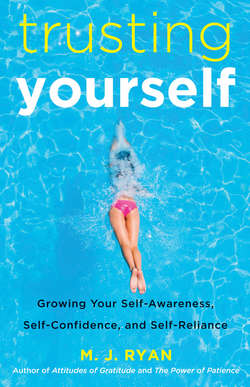Читать книгу Trusting Yourself - M. J. Ryan - Страница 18
На сайте Литреса книга снята с продажи.
We Live More Happily with Life's Messiness
ОглавлениеDespite our search for stability and prediction, for the center of our lives to hold firm, it never does. Life is wilder than that—a flow we can't command or stave off.
—Sharon Salzberg
If insanity is doing the same thing over and over, expecting different results, what is thinking the same thing over and over despite evidence to the contrary? I refer to my chronic illusion that someday everything is going to calm down in my life and I will Get Everything Under Control. In my mind, it's soon, just not now: after I sell my business, after my husband gets a new job, after I write this book. It's such a part of my thinking that the only reason I noticed it is that I caught myself in a conversation with my friend Barb, saying the exact same thing I had told her last year and the year before: “I'm crazy busy now, but after this year, things should calm down.” Barb was gracious enough not to say, “Yeah, right,” but I could sure hear her thinking it.
I'm not alone. It seems as though most of us believe in that mythic place of peace and prosperity, when we will finally have all our papers sorted, our e-mails answered, and our towels perfectly rolled in the linen closet. All we have to do is (take your pick) read a book on time management, finally get organized, wait until our toddler is out of the pulling-everything-out-of-the-closets phase. Then we do those things and something else pops up as the fly in the ointment. Or we don't because we're too darn busy with the forty other issues that came out of nowhere in the meantime.
We're operating under this illusion because we've been sold a bill of goods from a wide variety of so-called experts that we can nail everything down and have a house that looks like something out of Martha Stewart Living. That we can control our destiny through attitude alone—but what does that say about the millions of us who have serious illnesses, that our diseases are our fault? We are told we're the masters of our fate—but what does that say about us when we get caught in a corporate downsizing that is part of sweeping global economic changes? We believe it is somehow our fault if our lives are messy and complex.
In reality, we can never get our lives totally under control because so many factors that influence them are not under our command. According to authors John Briggs and F. David Peat in Seven Life Lessons of Chaos, “Chaos theory demonstrates why such a dream [of control] is an illusion. Chaotic systems lie beyond all our attempts to predict, manipulate, and control them.” And the more we accept that, the more we will stop fighting the way things are.
Most likely we will never get to the end of our to-do lists. The more we give up our illusion that “someday” we will have it all together, the more we can relax into the reality of our lives as they are—with all their chipped teeth, blown schedules, and jam on the walls. Trusting ourselves helps us do that.
Trust in ourselves is not about feeling invincible, infallible, or in complete control of our lives. Rather, it's knowing that the messiness of life is not our fault. It's just the nature of life itself—unpredictable and uncontrollable. With self-trust, we understand that power and peace is found in “response-ability,” our capacity to meet life as it comes at us. When we believe in our ability to respond, we don't fight against the wildness of life because we know we'll handle what comes our way when it arrives.
It also helps to remember that life's unpredictability brings us joy, too—the fact that things happen out of the blue: a call from a friend you haven't heard from in twenty years; a job opportunity that falls out of the sky; a great conversation with your child because your oven broke and you had to go out to dinner. I know someone whose sister canceled her wedding at the last minute because she met the love of her life. Messy? You bet, but what happiness she found.
When I trust myself, I can see what happens as a dance between me and life. Sometimes I'm leading, sometimes I'm following, but the beauty and grace comes from responding to my partner rather than insisting that it must be my way. I'm constantly being asked to learn new steps, and somehow I figure out how to do them. And if that means the twenty-two-inch-high pile of files has to stay on top of my filing cabinet for another three years, so be it.
